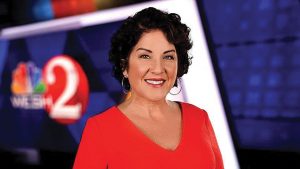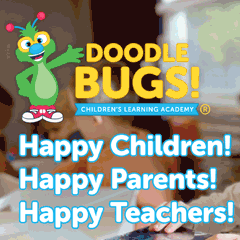The Heart of Central Florida
As an anchor for WESH 2 News, Nancy Alvarez has a history of giving the community a voice and imbuing her reporting with a humanistic angle.

Nancy Alvarez is known for her in-depth approach to broadcast journalism and being a voice for the Central Florida community. After growing up in Fort Lauderdale, she moved to Orlando at 23 to pursue a career as the Brevard County reporter for Channel 13. After Alvarez “fell in love” with the area, she quickly worked to become an integral part of it.
In her current position at WESH 2 News, she covers major national and local news in an immersive manner and forms a connection to those affected by any topic she covers. Look no further than when she was the first reporter from Central Florida to visit Puerto Rico after Hurricane Maria, and returned several times throughout its recovery efforts.
Orlando Family Magazine spoke to Alvarez to learn more about her career, life and advocacy.
How has your career evolved across your nearly 25 years in broadcast journalism?
I think my career has evolved based on the things that I’ve covered and the things that I’ve witnessed in our community and the growth that we’ve seen in Central Florida. So much has changed here since the time that I arrived, and so I’ve had to evolve with it. I’ve tried to not just be a witness to things that happen in our community as a journalist, but also as a participant to support where I can.
Being engaged in the community has helped me become a better storyteller. I think I can convey the impact of a lot of the things we report because I’m involved and engaged. I try not to keep our stories on the surface, but really give it that depth it deserves.
You’ve covered so many emotional stories. What would you say is the key to approaching those tough topics?
The key to approaching the tough stories is reminding ourselves that we have a responsibility as journalists to get things right, to set emotions aside, to make sure that we’re reporting everything in an authentic way. Really, that’s how these events are going to be remembered: how we report it. We’re reporting on events, but we’re also Central Florida’s historians in a way, because we’re the ones that are defining how these events will be remembered for generations to come.
With events like Pulse, of course we had to report all the facts, and we had to report the difficult aspects and the tremendous loss—but, wow, did all the stations go above and beyond reporting the millions of ways that our community came together. I think that that will forever be remembered as a time that Central Florida was united and that we really showed the world how to grieve, and how a community can truly lift itself up and lift each other up.
What are some values that you always abide by while reporting?
My values are, first and foremost, get it right. Our credibility is everything, especially now when people have so many different resources and so many different ways to get information. Ensuring that people know that we are a neutral, credible source is a priority. It’s more important than ever. After the credibility component, it’s also reporting with compassion, empathy and a real awareness of the impact of all the stories that we report, ensuring that we convey that real people are affected by these events in our community—whether we’re covering crime, politics or the weather. At the end of the day, there are real people behind every story and they are the priority, and making sure that we make that connection is really the most important thing for me.
Are there any topics that you’re particularly fond of covering?
There’s so many! I’ve done a lot in our nonprofit community. We have some incredible nonprofits doing invaluable work in our community. We have so many issues—from the housing crisis to homelessness to issues with inequities in health care, in education—and we can’t always wait on Tallahassee and Washington to fix our problems. We know our lawmakers are working, and we know that they’re fighting for many of the issues that we’re dealing with on a local level, but here in the trenches at home, we know we can’t wait. We can’t sit around and wait for funding or legislation.
There are nonprofits that are doing incredible work, day in and day out, to help families and to uplift children and families in our community who need it. I’m really passionate about making sure those stories are told and that people know that these nonprofits are doing this work. There’s a million ways to help our nonprofits in our community through donations, through volunteering. I don’t think they get enough exposure, that’s for sure.
In addition to your nonprofit work, you are an advocate for early breast cancer detection. What education do you strive to impart most from your experience?
I was diagnosed three years ago and I learned so much. I was lucky that my breast cancer was caught very early, and so I advocate as often as I can for early detection and making sure that women who run around taking care of everybody first—like me—take care of themselves. Had it not been for that mammogram, I don’t know how things would have turned out for me. So I’m very grateful, but I think it’s also important to talk about the reality for many women that are diagnosed with breast cancer, who are uninsured or underinsured and don’t have the same options. I think everyone should have access to quality health care, and I think everyone should have access to swift health care when you receive a diagnosis like that. If you’re uninsured or underinsured, you shouldn’t be put on a waiting list and told to come back in a month for that biopsy, because that wrecks your mental health. Everyone should have equity when it comes to how we’re diagnosed and how we’re treated, and everyone should receive the same amount of respect and quality care.
What do you enjoy outside of journalism?
My No. 1 job outside of journalism is running after my children and managing their social lives. I have a teenager and a tween. I didn’t know that their social lives would be at the level to which they are, which is a wonderful thing. In my spare time, I am driving children around and coordinating all of their activities, but I love reading and going to the theme parks with my kids and the beach. We have two dogs, and our dogs are like our family members.










